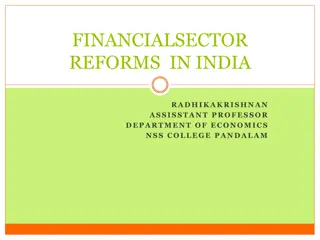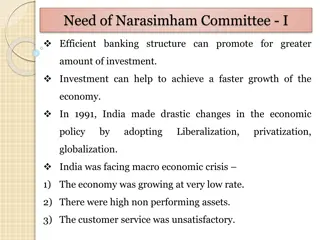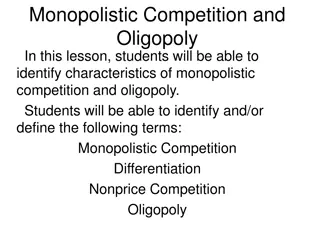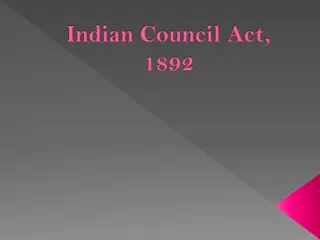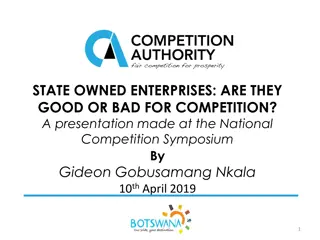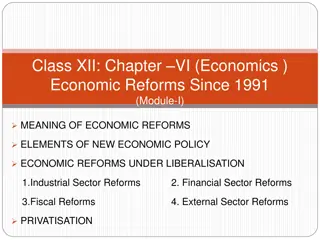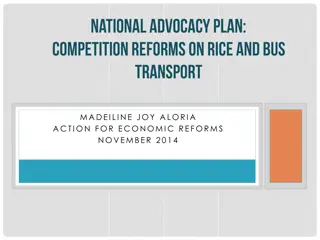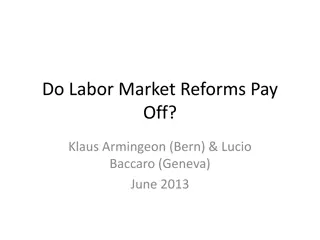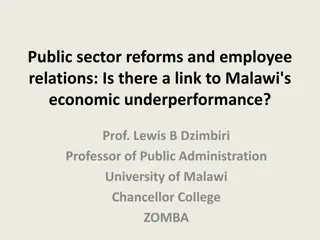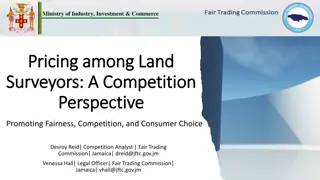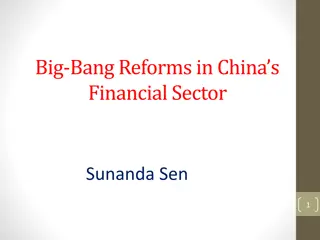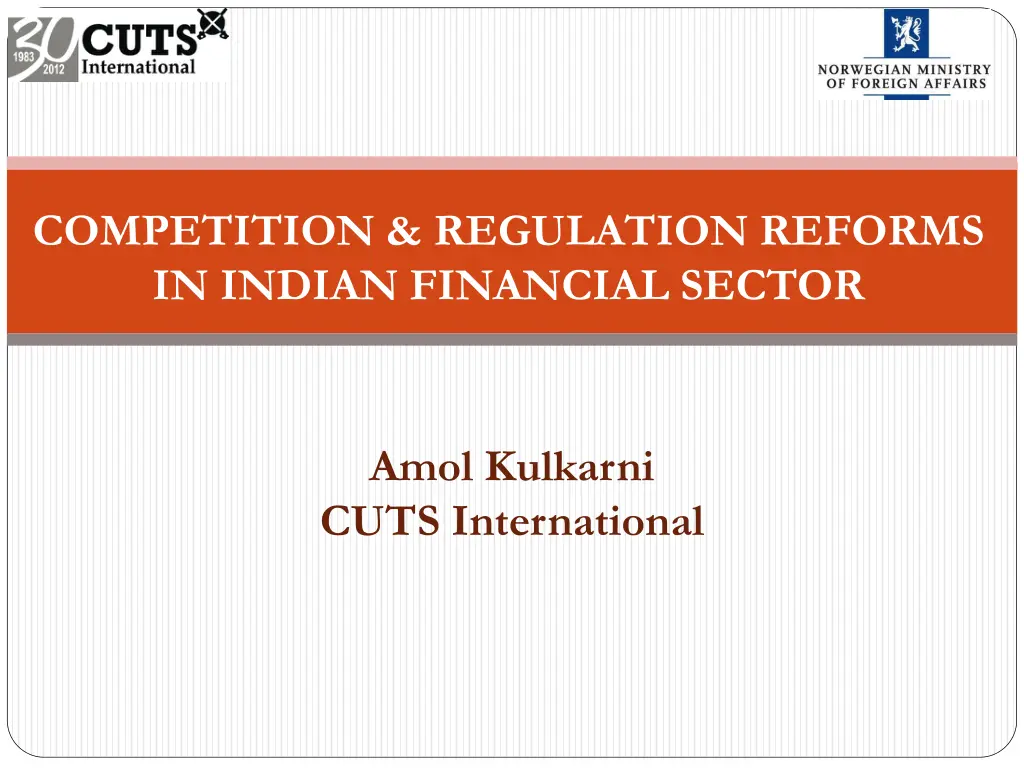
Competition and Regulation Reforms in Indian Financial Sector Analysis
Explore the comprehensive analysis of competition and regulation reforms in the Indian financial sector, covering insights on banking, insurance, regulatory frameworks, and more. Gain valuable perspectives on managing competition, regulatory discretion, and challenges in grievance redressal.
Download Presentation

Please find below an Image/Link to download the presentation.
The content on the website is provided AS IS for your information and personal use only. It may not be sold, licensed, or shared on other websites without obtaining consent from the author. If you encounter any issues during the download, it is possible that the publisher has removed the file from their server.
You are allowed to download the files provided on this website for personal or commercial use, subject to the condition that they are used lawfully. All files are the property of their respective owners.
The content on the website is provided AS IS for your information and personal use only. It may not be sold, licensed, or shared on other websites without obtaining consent from the author.
E N D
Presentation Transcript
COMPETITION & REGULATION REFORMS IN INDIAN FINANCIAL SECTOR Amol Kulkarni CUTS International
Background India Competition and Regulation Report National reference group Secondary research Expert comments Perception surveys perception index http://www.cuts-ccier.org/icrr/icrr.htm 2
Outline Banking RBI NBFCs Insurance Regulation, Competition, and Consumer Protection RBI, SEBI IRDA Learnings from financial crisis Issues for discussion and way forward 3
Entry and performance conditions Minimum capital and reserve requirements Prudential norms - capital adequacy and market discipline Income recognition, asset classification and provisioning Fit and proper test for directors Goodhart Committee (2012), Risk management concerns of individual banks are quite different from those of regulators. It should not be for the government/ regulators, to try to determine how much risk market participants take on board, nor to set out the particular way that they assess such risks. 5
Regulatory discretion Impose additional conditions Reject application - eg. NBFCs licence may be issued subject of such conditions as the [regulator] may think fit to impose. any other condition, the fulfilment of which would, in the opinion of the [regulator], be necessary to ensure the carrying on of business that the public interest shall be served by the grant of certificate of registration 6
Inadequate grievance redressal No judicial or quasi-judicial appellate body Appeal to Central Government within 30 days Writ courts don t get into merits 7
Preference to public sector Exclusion of general corporate laws Winding up provisions Explicit and implicit privileges LIC - government guarantee Implicit deposit guarantee - 80% ICRR respondents believed government won t let public sector entities fail Access to public funds - Rs. 14,000 cr. in 2013-14 High NPAs (3.84% v. 1.91%) Low ROA (0.78% v. 1.63%) 9
Differential regulation of NBFCs Lighter regulation for NBFCs Relaxed prudential norms and less approvals 46% ICRR respondents believed creates uneven playing field RBI working group on NBFCs (2011) No benefits under SARFAESI Act Inadequate tax benefits (TDS and indirect tax) - MoF Report Recent experiences show that such shadow banking entities can pose potential threats to long term financial stability if their transactions connect to banks, the banking system, or asset markets EU Banking Sector Expert Group (2012) 10
Regulatory co-ordination Amongst financial regulators Bancassurance guidelines Linked insurance products Securities Laws (Amendment) Ordinance, 2013 With Competition Commission of India Proposed amendment on mandatory consultation Banking Laws (Amendment) Act, 2012 For systemic regulation Role of Financial Stability and Development Council 11
Systemic regulation 3.85 Inter-regulatory coordination without third party involvement 11.54 Inter-regulatory coordination at FSDC 23.08 Macro-economic supervision and dispute resolution by FSDC 61.54 Don't know/Can't say 12
Unfair business practices Product bundling 49% ICRR respondents perceived it to be unfavourable practice Misselling Inappropriate product Unreasonable charges Fraudulent entities Kay Review (2012), identified short-termism as principal problem. 14
Unsatisfactory implementation Non-availability of comparison Complex KYC requirements Prohibitory for excluded class Duplicity and cumbersome Ineffective Ombudsman One of the outcomes of financial crisis in severely affected economies was realisation of loss of trust born of profound lapses in banking standards retail and business customers alike are often denied sufficient choice or access to enough information to exercise effective judgment. Parliamentary Commission on Banking Standards, UK (2013) 15
Developments at home Bank Licensing Guidelines (February 2013) it may not be possible for RBI to issue licenses to all the applicants meeting the eligibility criteria RBI Discussion Paper on Banking Structure (August 2013) it is important that the entry norms should be stringent so as to encourage entry by only well-qualified entities in order to improve the quality of the banking system RBI Scheme for WOS by foreign banks (November 2013) Reciprocity, single mode of presence, and near national presence 17
Developments abroad Twin peak model Dodd-Frank Act Make banking boring Simple financial products and suitability requirements The regulators must only focus on maintaining competition, managing information asymmetry, and systemic concerns , Geneva reports (2009) 18
Issues for discussion Need for reforms? What kind of reforms? Taking in account expanding needs of Indian economy Global financial sector back to the basics Are we going in circles? Is this the law of nature? 20
Demands of ICRR respondents Establishment of a unified regulator for financial sector Creation of a super regulator over and above existing regulators 3.77 13.21 20.75 Clarity in objectives of each of the existing regulators Increase in power of each of the existing regulators 9.43 18.87 Improving accountability of each of the existing regulator 18.87 15.09 Improving coordination and communication between existing regulators Don't know/Can't say 21
THANK YOU 22




